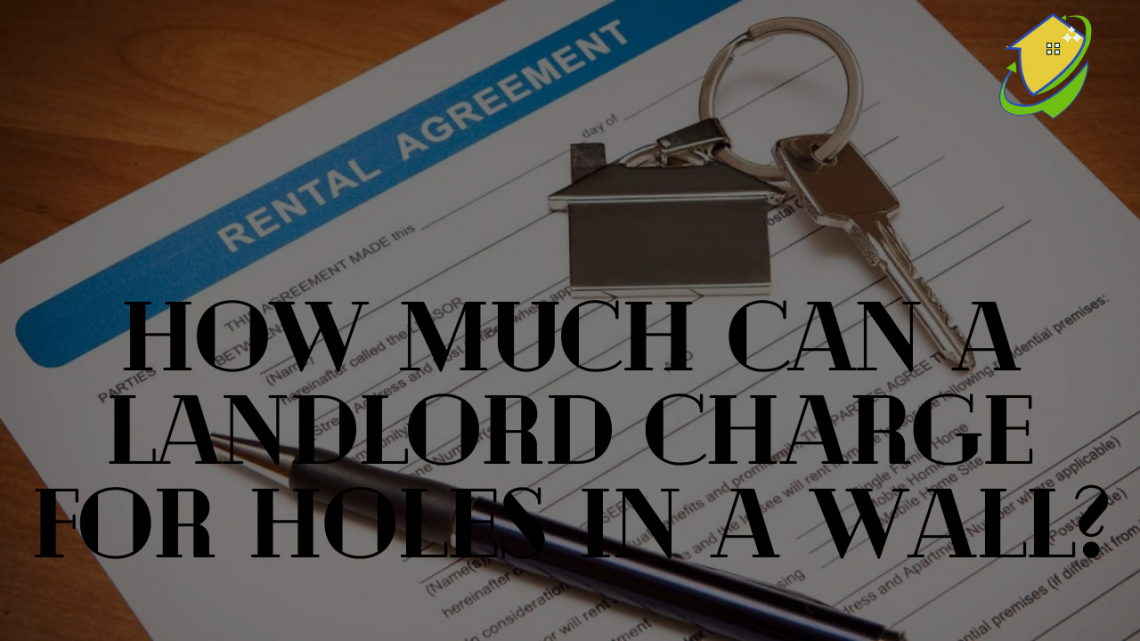How much can a landlord charge for holes in a wall?
August 11, 2021Moving is stressful enough without having to worry about whether or not your landlord will return your deposit. Landlords make deductions for a variety of reasons. However, the days of unscrupulous landlords who would keep your tenancy deposit regardless of the circumstances are long gone.
Your money is now safeguarded by law under a government system for rental property. It will remain there until it is time for tenants to move on. This is the time to double-check that the property is in excellent working order and that your landlord is deducting the correct amount.
If there are problems with the property, it’s pointless to request a full deposit. For a variety of reasons, your landlord may take money from your security deposit. We’ll go through everything your landlord may and can’t withdraw from your deposit in this quick guide.
Rent and bills that have not been paid
Unpaid rent is the most evident deduction. If you haven’t paid your rent in a while, your landlord may deduct this from your deposit. If you have to leave quickly when a bill is due, make a note of the metre readings and take a dated image of them. You may therefore be certain that your landlord will withdraw the proper amount from your security deposit.
Redecoration
Your landlord is unlikely to be grateful for your labour on their property. You’ll have to repaint over the wall if you want your money back in full (s). Unless your landlord has specifically asked for or commissioned your work!
Similarly, if you damage the walls by drilling holes to hang your own photos, you’ll know why your deposit is being deducted. You may re-plaster the drilled hole yourself, but be sure to do it carefully. It’s preferable to avoid drilling holes altogether. With a metal drill, you run the risk of striking a water line, a gas pipe, or, even worse, electricity.
Cleaning
Before renters come in, most buildings are meticulously cleaned. After all, your landlord is attempting to rent the home, and a soiled appearance is never appealing. You should keep the property tidy to the same quality as when you first moved in. It’s excellent if you’re good at cleaning, love it, and have some free time. Otherwise, save yourself time and money by hiring an expert End Of Tenancy Cleaning Company. A one-bedroom house may be cleaned for about £99.
The cost of end of tenancy cleaning starts at about £24 per hour, therefore the overall cost will be determined by how unclean the house is. If you have dogs, for example, the home may require additional cleaning to remove odours. Many cleaning businesses provide additional services including mattress, curtain, upholstery, and oven cleaning.
If you haven’t cleaned, you may expect your landlord to contact these companies and take the fees from your deposit. As a result, the best option is to conduct the cleaning yourself, as you’ll only be invoiced. Nobody wants to be embarrassed by leaving a property in a state of disarray. Furthermore, if you want a solid recommendation for future rentals, make sure you leave it in good condition.
Gardening
If the home includes a garden, your landlord is likely to have included a condition in the rental agreement requiring you to maintain it. That isn’t to say you have to grow begonias. However, you must ensure that the garden does not get overgrown.
Expect to spend about £14-25 per hour a gardener is required to clean the garden or have your landlord take this amount from your rent. Depending on the size of the garden, it might take a whole day or more. So, towards the conclusion of a tenancy, put on your gardening gloves and enlist the aid of some friends to deal with an overgrown yard.
Wear and Tear is something your landlord can’t take from your rent
It’s natural for things to fade, wear out, cease operating, and get old after five years of living in a place. Wear and tear on carpets, upholstery, and curtains may not be deducted from your deposit.
It’s also possible that low-cost white goods like kettles and toasters have given up the ghost. Microwaves, refrigerators, dishwashers, and washing machines that were not brand new when you moved in are also prone to fail. When the toaster broke, it’s doubtful you phoned your landlord. However, it is not your fault. You can also challenge any deductions for replacements made by your landlord at the conclusion of your tenancy.
Give the walls a thorough cleaning. However, after a longer tenancy, minor scuffs on the walls are to be expected. You are not liable for a fresh coat of paint on the walls. Painting an entire property may be expensive, so if your landlord wants to take it from your deposit, you should say no.
How to Recover Your Deposit
Request your deposit returned from your landlord once your tenancy ends. Your landlord has ten days to refund your deposit or contact you if any deductions have been made. If your landlord deducts anything from your rent, they must explain why.
If not, start by talking to your landlord in a calm and professional manner about the situation. In the interim, the landlord is required to refund the portion of your deposit that is not in question. The TDP programme is a fantastic resource for tenants. If you and your landlord are unable to come to an agreement, you might seek alternative dispute resolution (ADR).
This service is completely free. The case will be reviewed by an impartial adjudicator who is an expert in tenancy law. You will have a greater chance of collecting your money if you have recorded documentation of the property when you moved in. He or she will examine the slightly hazy region of wear and tear using whatever evidence is available.
Tenancy Security Deposit Checklist: Things to Keep in Mind
You will be able to collect your deposit as well as obtain favourable recommendations from landlords if you leave a home in good condition.
- Make an inventory – While it may appear to be a tedious and pedantic process, recording the state of the property might be critical evidence for an ADR adjudicator.
- Pay your bills and rent on time.
- Before you leave, make a record of your metre readings.
- Pay for small repairs like light bulbs that have blown out and holes in the walls.
- Do an end-of-tenancy cleaning yourself if you have the time or hire a professional if you don’t.
- Check that the garden is up to par with what it was when you first moved in.
- Remove odours from cigarettes and pets.
- Remove all trash and personal belongings.
- You have ten days to refund your deposit or contact your landlord.
- Know the difference between normal wear and tear and damage.
- In the event of a disagreement, the best course of action is to stay cool and rational.
- If you disagree with the deductions made by your landlord, the ADR can assist you for free. Provide all of your evidence in a logical order. The judgement of the ADR is final and cannot be appealed.




nice information for a new blogger…it is really helpful
Depois que a maioria dos telefones celulares for desligada, a restrição à entrada incorreta de senha será suspensa. Neste momento, você pode entrar no sistema por meio de impressão digital, reconhecimento facial, etc.
Hey,
The moment we’ve all been waiting for is finally here – GoBuildr is now LIVE! 🎉
🌐 Create ultra-lightning-fast websites, sales funnels, eCommerce stores, and more in less than 60 seconds, with just a keyword!
🚀 Say goodbye to the limitations of traditional page builders. GoBuildr combines the functionality of 16 different tools into one powerful app, supercharged with AI-assisted technology.
⇒ Click Here To Checkout Demo https://ext-opp.com/GoBuildr
Hey,
The moment we’ve all been waiting for is finally here – GoBuildr is now LIVE! 🎉
🌐 Create ultra-lightning-fast websites, sales funnels, eCommerce stores, and more in less than 60 seconds, with just a keyword!
🚀 Say goodbye to the limitations of traditional page builders. GoBuildr combines the functionality of 16 different tools into one powerful app, supercharged with AI-assisted technology.
⇒ Click Here To Checkout Demo https://ext-opp.com/GoBuildr
He Got 256,354 Free Views With AI…
Can you believe it?
People spend thousands of dollars to get that kind of result…
My friend Kundan just did it for free…
He only used his new app… AI ScreenSnap…
It’s the world’s first AI app that can generate videos with the power of Video-Exclusive AI Engine…
That can edit, record, and generate videos with just a few clicks… with zero experience…
Click here now and watch AI ScreenSnap in action https://ext-opp.com/AIScreenSnap
[Hot] AI Turns Any Photo, URL or Keyword into “Talking Head” Videos – https://ext-opp.com/AiTalkie
[Hot] AI Turns Any Photo, URL or Keyword into “Talking Head” Videos – https://ext-opp.com/AiTalkie
A.I Create & Sell Unlimited Audiobooks to 2.3 Million Users – https://ext-opp.com/ECCO
A.I Create & Sell Unlimited Audiobooks to 2.3 Million Users – https://ext-opp.com/ECCO
Create Stunning Ebooks In 60 Seconds – https://ext-opp.com/AIEbookPal
Elevate Learning Adventures with The Story Shack!
A library of 200+ high-quality books tailored to the school curriculum.
StoryShack’s Build a Book bundle features word searches, quizzes, creative coloring pages, high-quality images, and top SEO keywords.
StoryShack’s StoryCraft Pro bundle includes the “Melody Minds Library” with 350+ music tracks and “AnimateMasters Pro,” offering 30+ categories of animations.
And as if that’s not enough, here are the MEGA BONUSES:
✔ 100+ Mega Mazes Pack
✔ 100+ Sudoku Elements Pack
✔ 100+ Comic Book Template Pack
✔ 100+ Handwriting Practice Template Pack
✔ 100+ Kids Story Book Templates
✔ Canva Book Templates
✔ Additional beautiful content like journal prompts
✔ INCLUDED: The Ultimate Workbook
Click https://ext-opp.com/StoryShack to explore The Story Shack e-Learning Collection and seize the opportunity for multiplied income!
Millions of Free Traffic with AI Tools – https://ext-opp.com/AIVault
Millions of Free Traffic with AI Tools – https://ext-opp.com/AIVault
Millions of Free Traffic with AI Tools – https://ext-opp.com/AIVault
Millions of Free Traffic with AI Tools – https://ext-opp.com/AIVault
After Generating Millions Online, I’ve Created A Foolproof Money Making System, & For a Limited Time You Get It For FREE… https://ext-opp.com/RPM
ChatGPT powered Autoresponder with Free SMTP at Unbeatable 1-Time Price! https://ext-opp.com/NewsMailer
An Ultimate Web-Hosting Solution For Business Owners https://ext-opp.com/HostsMaster
MobiApp AI – True Android & iOS Mobile Apps Builder (Zero Coding Required) https://ext-opp.com/MobiAppAI
Word’s First NLP & ML Based Email, Voice & Video Marketing Autoresponder Thats Boost Email Delivery, Click & Open Rates Instantly https://ext-opp.com/VidMailsAI